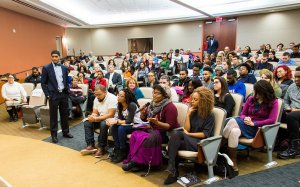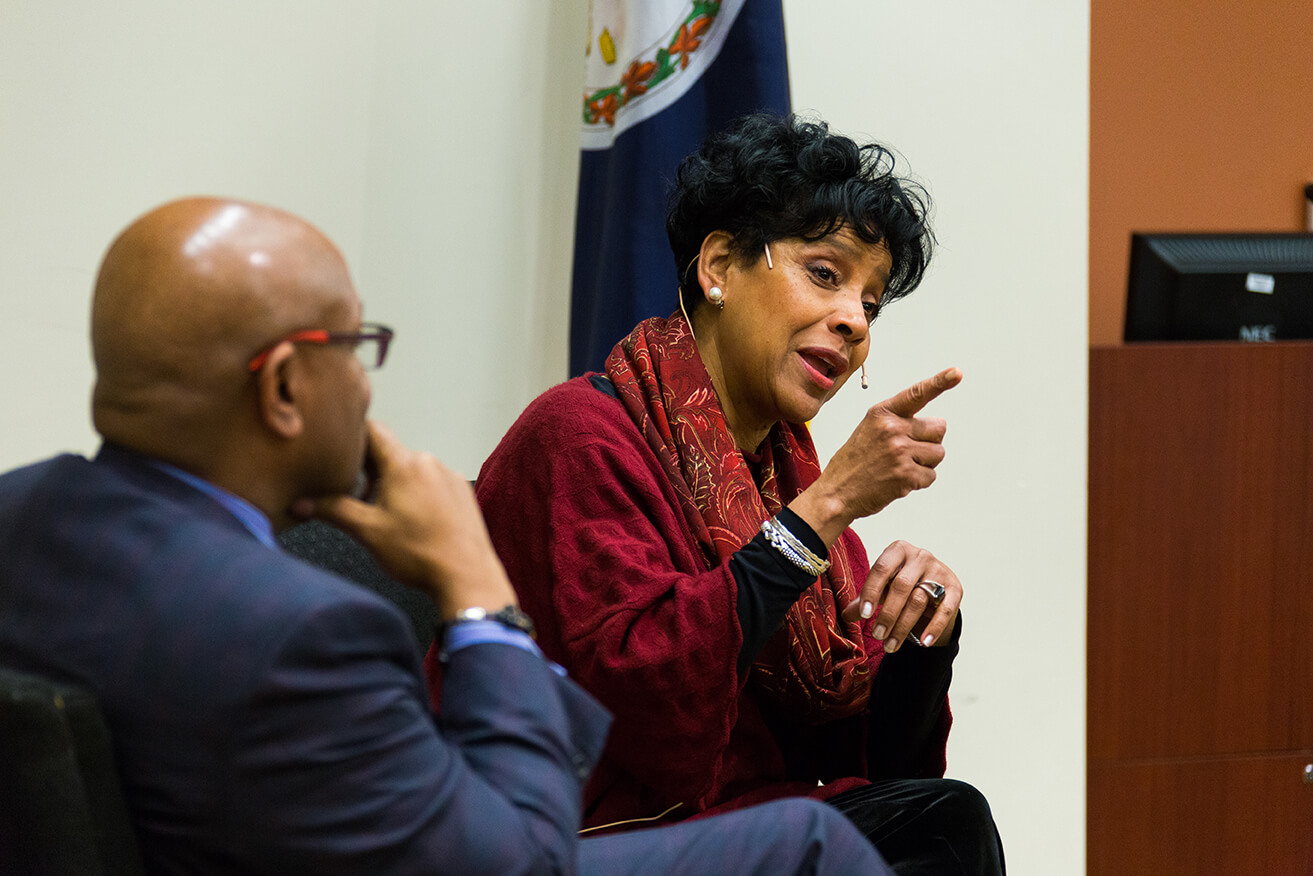Tony Award-winning actress, singer and stage director Phylicia Rashad, a household name as a result of her role as Clair Huxtable on the NBC sitcom “The Cosby Show,” braved Winter Storm Jonas on January 25 to travel to Winchester to speak to a crowd of about 300 campus and local community members as a Harry F. Byrd, Jr. School of Business Distinguished Lecture Series guest speaker.
Rashad, who appears in “Creed,” the most recent installment of the “Rocky” film series, conducted an extended conversation, titled “The Business of Show Business,” providing helpful tips for aspiring performing artists, directors, writers, producers and arts managers.
Framing the ‘Business of Show Business’
In her conversation with Miles Davis, Ph.D., dean of the Harry F. Byrd, Jr. School of Business, Rashad described the birth of a TV series, from initial concept to pilot, to marketing and distribution, and to casting and production management. Each of these stages requires a dedicated team of professionals to keep the people and the project on time and on budget.
“Before a television show reaches the screen there are several processes involved, including the initial treatment, the presentation of the treatment, the script, the review of the script, distribution to the appropriate producers and budget development, which includes planning for everything, from the person above the title to craft services, to producers, directors/assistant directors, camera crews, stage managers, booms, lights, control booth, hair and makeup, and wardrobe,” said Rashad.
Once a budget is determined, decisions are made about the target audience, the project is marketed and pitched to networks. Sponsors are then sought and committed. Rashad stressed that even at this point, a show is not yet a done deal. A network may still decide to move it forward or stop development altogether.
“All this is done before you even consider the talent,” said Rashad. “When you do the pilot, it is a big affair. It’s where the world of the series is created, that world you are going to see every week.”
At the pilot stage, details become very specific. Decisions are made regarding what appears on set, and colors are selected for every part of the show’s visual presentation. “Nothing is haphazard,” she said.
Rashad described casting as the last piece of the puzzle. Offers may be extended to well-known actors or casting might be conducted in open auditions for known or unknown talent. Casting managers determine if auditions will be conducted in a particular city or in several locations.
“Once the talent is on board, [the actors] are fitted for their clothing. Then there is the read. All of this is budgeted, and all of this has to be done on time,” she said.
Once the project is in the studio, producers and directors continue to manage logistics, consider legal decisions affected by labor unions, and adjust payroll to address variable costs for production, including overtime.
“When the credits roll, few people see the costs associated with production,” she said.
Show Business Tips for Students
Rashad shared 10 tips to consider for success within the entertainment business.
-
Cultivate a Persistent Work Ethic
“My father was a dentist and my mother was a poet,” said Rashad, who credits her family’s strong work ethic and passion for the arts as foundational for her longevity in film, television and on the stage. “We grew up watching my parents work, and we grew up focused on realizing our potential through our work. Work gives purpose and life, and there is no burden in work. The work is the career, and the work is unending. You carry your work ethic with you wherever you go.”
-
Be Honest and Know Yourself
 “My mother, Vivian Ayers, told me to ‘know your own worlds of being,’ and to ‘stay within your own element,’” she said. “When I was a freshman at Howard University, we had a very well-intentioned speech professor. She was Irish. One day she said to us, ‘You know, there really is no place in the theatre for Negro actors. You really should consider another vocation.’ Where would I be if I had considered that advice? ‘Know your worlds of being.’”
“My mother, Vivian Ayers, told me to ‘know your own worlds of being,’ and to ‘stay within your own element,’” she said. “When I was a freshman at Howard University, we had a very well-intentioned speech professor. She was Irish. One day she said to us, ‘You know, there really is no place in the theatre for Negro actors. You really should consider another vocation.’ Where would I be if I had considered that advice? ‘Know your worlds of being.’” -
Select Work That Resonates
Rashad said it’s important to find scripts that resonate with your inner voice and personality. “Artistic [expression] comes from inside ourselves; you can’t express something you don’t know,” she said. “As an actor and as a director, I look at the literature first. The script might be formed, but not perfectly formed. Is there something in there that resonates with me? I’m fortunate that I haven’t really done things that don’t have meaning for me.” She said she took jobs a couple of times out of loyalty to friends, but usually regretted it.
-
Find Your Way to Masters
On the topic of mentors, Rashad encouraged students to find their way to masters, those seasoned and talented professionals who will inspire and deepen your talents. “You don’t create [art] in a vacuum. Find your way to working with people who have done some of the things that you aspire to do, understanding that it is within you to create what has not yet been done. Most of what I learned about acting – those disciplines that sustain and uphold me as an actor – I learned from masters. I wouldn’t trade that experience for anything.”
-
Make the Most of Your College Experience
 Busy university students often get caught up learning to manage the many opportunities available in and out of the classroom. Rashad encouraged taking advantage of every opportunity. “As a college student you have lots of projects and productions, and you may be asked to participate in what other students are doing. Do everything. Do it now while you can. Now is the time when you can do it.”
Busy university students often get caught up learning to manage the many opportunities available in and out of the classroom. Rashad encouraged taking advantage of every opportunity. “As a college student you have lots of projects and productions, and you may be asked to participate in what other students are doing. Do everything. Do it now while you can. Now is the time when you can do it.” -
Cultivate the Company of Good People
In her experience, Rashad said it’s important to cultivate friendships with people who bring value and meaning to your life. “Hold fast to good company,” she said. “Please do not spend time with people who talk about how hard it is or how dire it is. Thoughts are things. Keep the company of good people and keep good thoughts.”
-
Think For Yourself
Make your own decisions. “As a human being, you don’t have to let other people figure things out for you,” said Rashad. “You can make choices, and make choices beyond your comfort level. When you move a little bit beyond that, you discover something about yourself.”
-
Know Your Artistic Responsibility
“We are [engaged in] the business of creativity and being creative. Have you ever had a moment in which you are engaged in whatever it is you are about, when thought slips away? Is there anything to compare with that? Nothing compares to that. That’s why we do what we do. In that moment, we are in the creative space, engaged in a creative process. We’re doing something inside ourselves that connects with everybody, that connects with our common humanity.”
-
Cultivate Inner Strength
 Make a conscious effort to engage in practices that bring your thoughts back in alignment with your core beliefs. “I spend time in meditation and prayer, and not for the sake of things; never for the sake of things,” she said. “I believe in omnipresence, and for me that means everybody in this room, and me too; it means everyone in this university, and me too; and it means everyone in this world, and me too. I believe in this. And as you go through the day, walking down the street, and you read headlines or blurbs that flash across your television screen, or you see how people behave with themselves and others, it sometimes challenges this belief.”
Make a conscious effort to engage in practices that bring your thoughts back in alignment with your core beliefs. “I spend time in meditation and prayer, and not for the sake of things; never for the sake of things,” she said. “I believe in omnipresence, and for me that means everybody in this room, and me too; it means everyone in this university, and me too; and it means everyone in this world, and me too. I believe in this. And as you go through the day, walking down the street, and you read headlines or blurbs that flash across your television screen, or you see how people behave with themselves and others, it sometimes challenges this belief.” -
Start Today and Keep Going
There’s no perfect place to begin or end your career. “You start where you start,” said Rashad. “One day, Denzel Washington considered being in films, and he had no experience. He started in the theatre, and it wasn’t always Broadway theatre. We were in a theatre all the way down in lower New York. You start where you are, and you keep going.”




